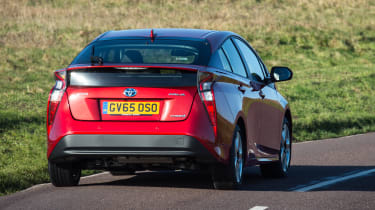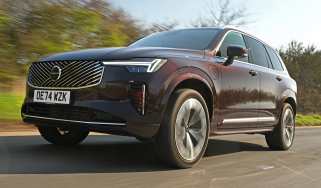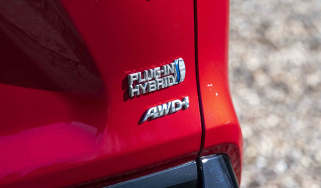Toyota Prius hatchback review (2016-2022)
"Whether you love or loathe its styling, the latest Toyota Prius is a practical and technology-filled hybrid that costs very little to run"
Pros
- Low running costs
- Good practicality
- Comfortable
Cons
- Divisive looks
- Limited rear headroom
- Noisy when worked hard
The original Toyota Prius was launched back in 1997 and is considered a pioneer in hybrid technology. With its low fuel consumption and emissions capturing the imagination of eco-conscious drivers.
Now in its fourth generation and very recently facelifted, the Prius is arguably one of the best traditional hybrid cars you can buy today. Part of its appeal is the increased breadth of the Prius range, with the car now available as a hybrid (Toyota refers to this as the 'self-charging' model) or as a plug-in, which has a larger battery that can be recharged using electricity from the grid. To give the Prius a wider appeal, Toyota has now added a four-wheel drive version - although it’s not available as a plug-in model.
The Prius has needed to evolve and improve as it now faces a raft of competitors, including the Hyundai Ioniq, which is available in standard, plug-in and pure electric guises. Other plug-in hybrids include the Volkswagen Golf GTE, Kia Niro and Hyundai Ioniq. All are impressive in their own way, but only the Ioniq and Prius were designed from the ground up as hybrids, and so are less compromised than those based on conventional petrol or diesel cars. If you'd prefer a more conventional hatchback instead, the Toyota Corolla shares the Prius' hybrid powertrain.
Under the latest WLTP fuel economy tests the Prius is said to be capable of between up to and 67.2mpg, while CO2 emissions range from 94 - 109g/km, which is no longer below the threshold for free entry into the central London Congestion Charge Zone.
More reviews
That’s the hybrid version, but the plug-in (which we’ve reviewed separately) is more efficient still. It can return up to 235mpg with CO2 emissions from 28-34g/km, meaning it attracts a low Benefit-in-kind (BiK) rate for company-car drivers.
You can distinguish the plug-in from the regular Prius by its different front and rear styling. Both models offer the same well furnished interior, and although there are a few cheap-looking plastic materials lurking in out-of-the-way places, on the whole the interior finishes look good and feel soft to the touch. All occupants are provided with plenty of legroom, but the curved, aerodynamic roof does limit headroom in the back.
Trim levels are Active, Business Edition, Business Edition Plus, Business Edition Plus AWD and Excel with 15” alloy wheels (which are more fuel efficient) and Excel (with 17” wheels). The entry-level model gets LED headlights, an infotainment system, adaptive cruise control, lane-departure warning and a rear-view camera.
Our pick is the Business Edition, which offers even more kit and represents good value, even if sat nav isn’t included as standard. It's sure to appeal to tech fans, thanks to wireless smartphone charging (now with a larger charging pad) and a colour head-up display that projects information into your field of vision.
Although hampered a little by its CVT automatic gearbox, tidy handling gives the Prius far more scope for driver enjoyment than you might think. Acceleration from 0-62mph takes a respectable 10.6 seconds, (10.1 in the plug-in hybrid) and the Prius is competent in just about any situation, especially in towns and cities, where it feels most at home.
Independent crash-testers Euro NCAP awarded the Toyota Prius a reassuring five stars out of five, partly thanks to its long list of safety features. Autonomous emergency braking is included as standard, identifying potential collisions and braking if necessary.
The Toyota Prius’ reliability is among the best in the car industry. It finished 16th out of the top 75 cars ranked in our 2020 Driver Power owner satisfaction survey of cars currently on sale in the UK. There's also the reassurance of Toyota's 10-year/100,000-mile 'Relax' warranty, introduced in June 2021.
After 20 years of hybrid sales, it’s clear Toyota takes great pride in the Prius and the plug-in especially is a real technological tour de force. It’s a safe, comfortable and extremely relaxing means of travel, with fuel economy figures that speak for themselves. Our main reservation is the considerable extra cost of the plug-in – it’s only worth it if you really need that long all-electric range.
See how this car scored on our sister site DrivingElectric.
















